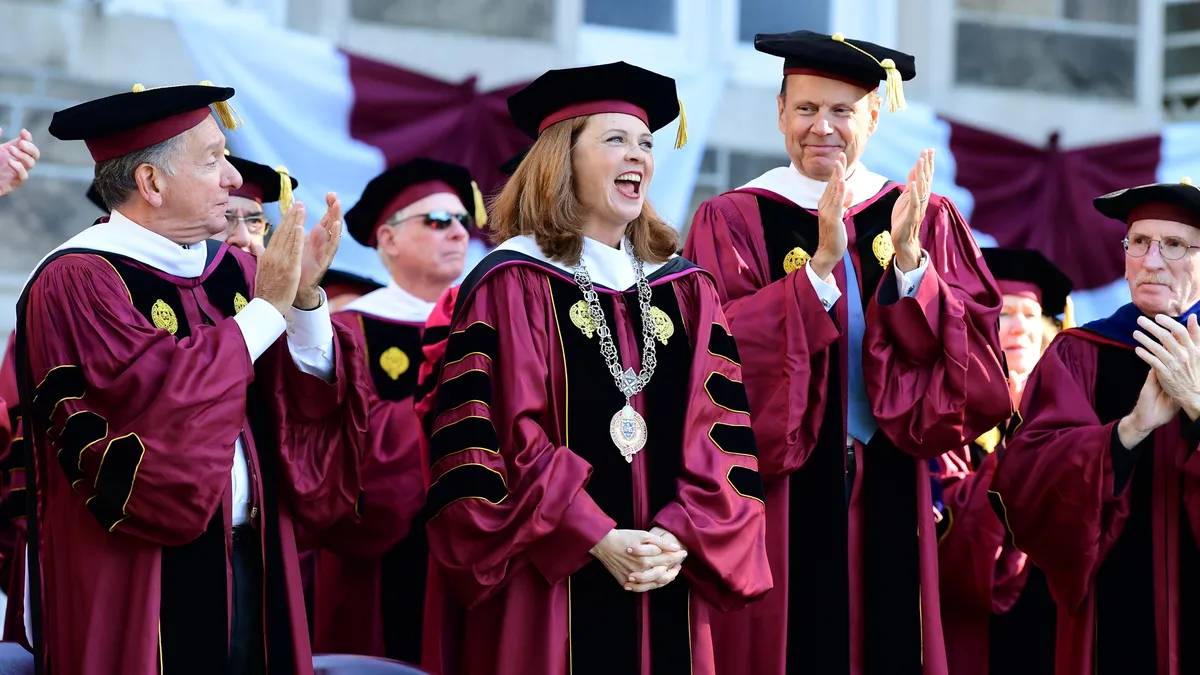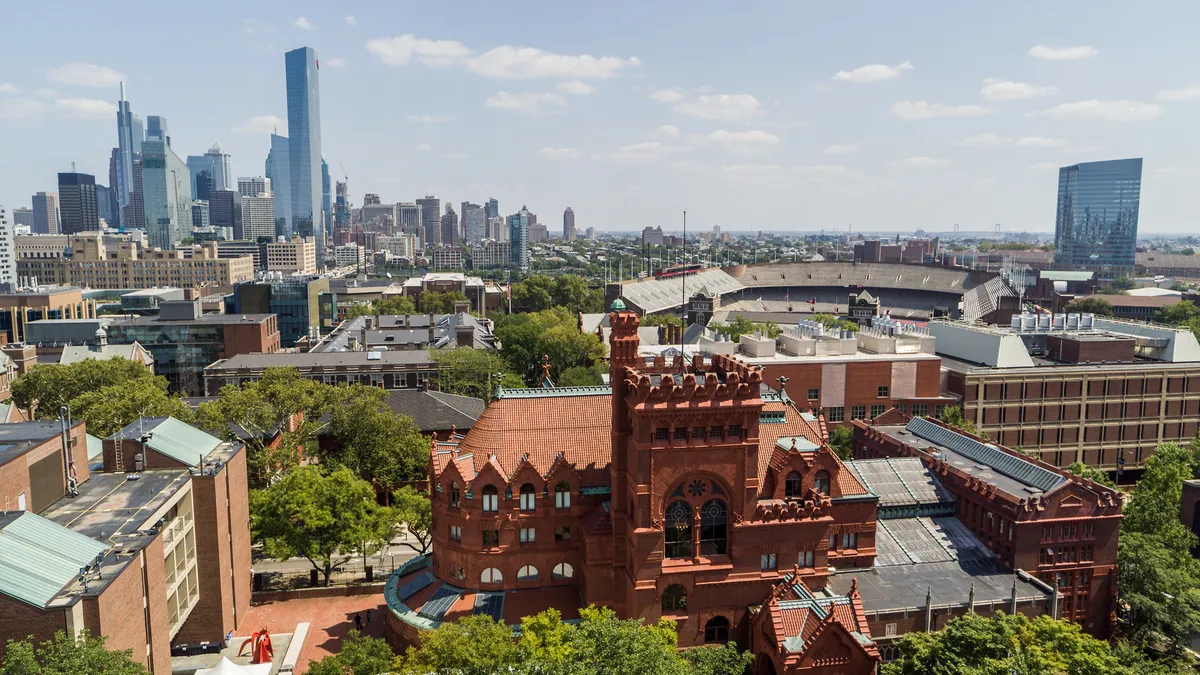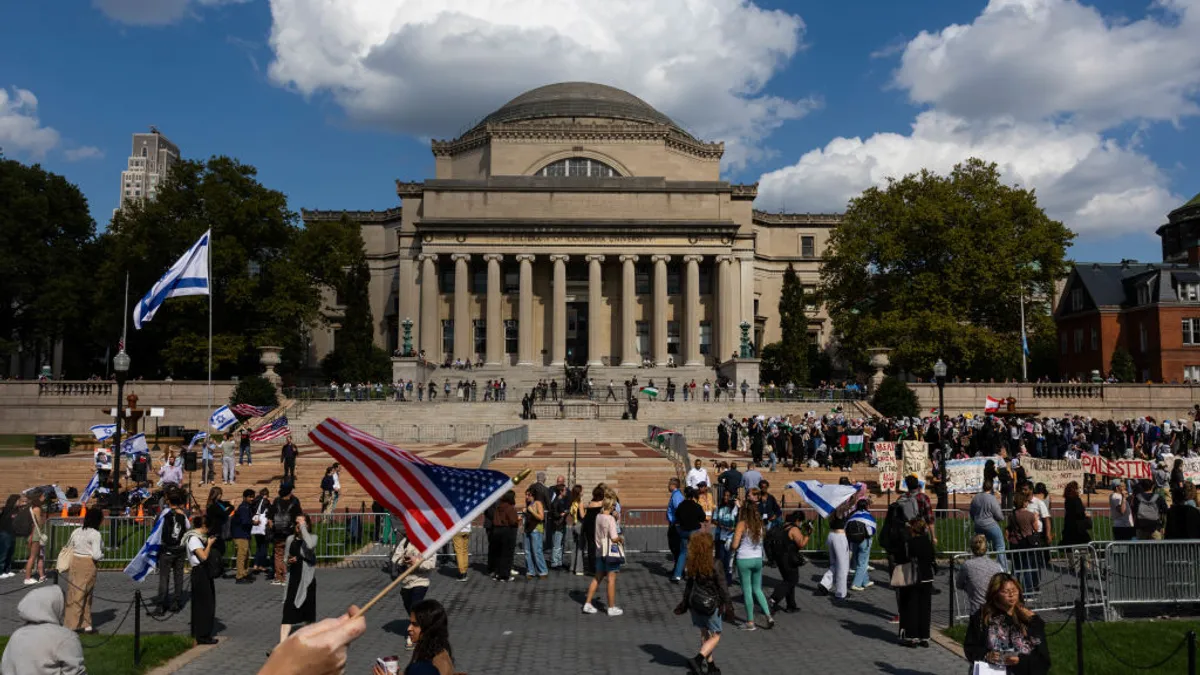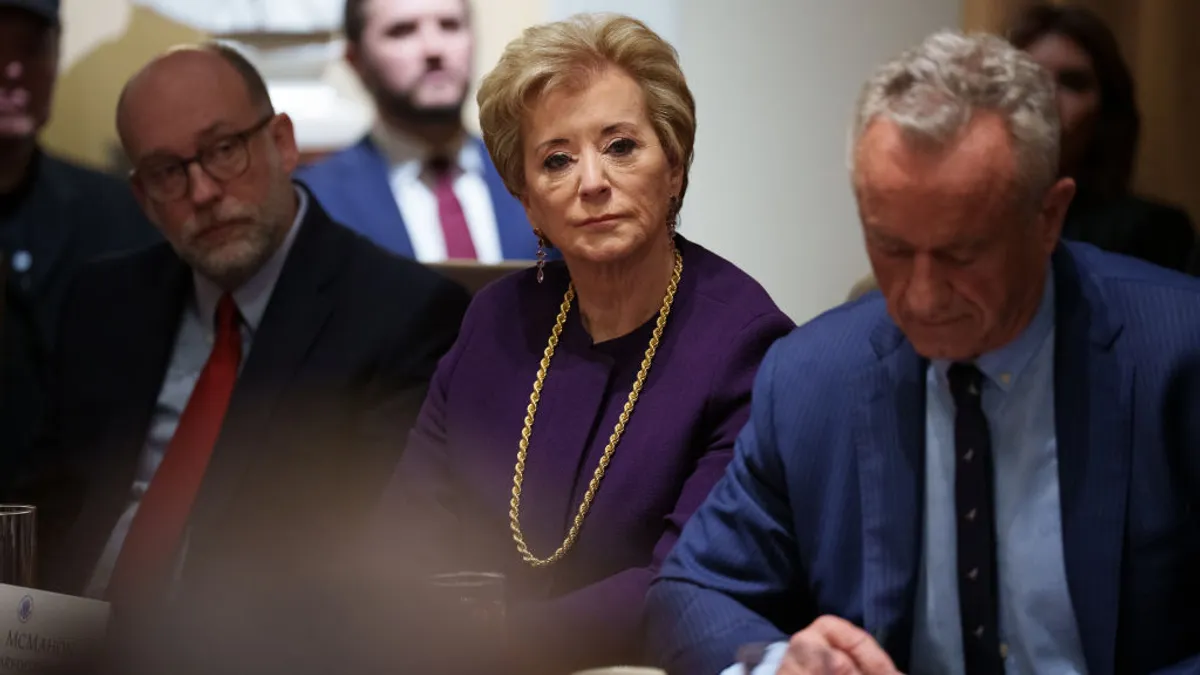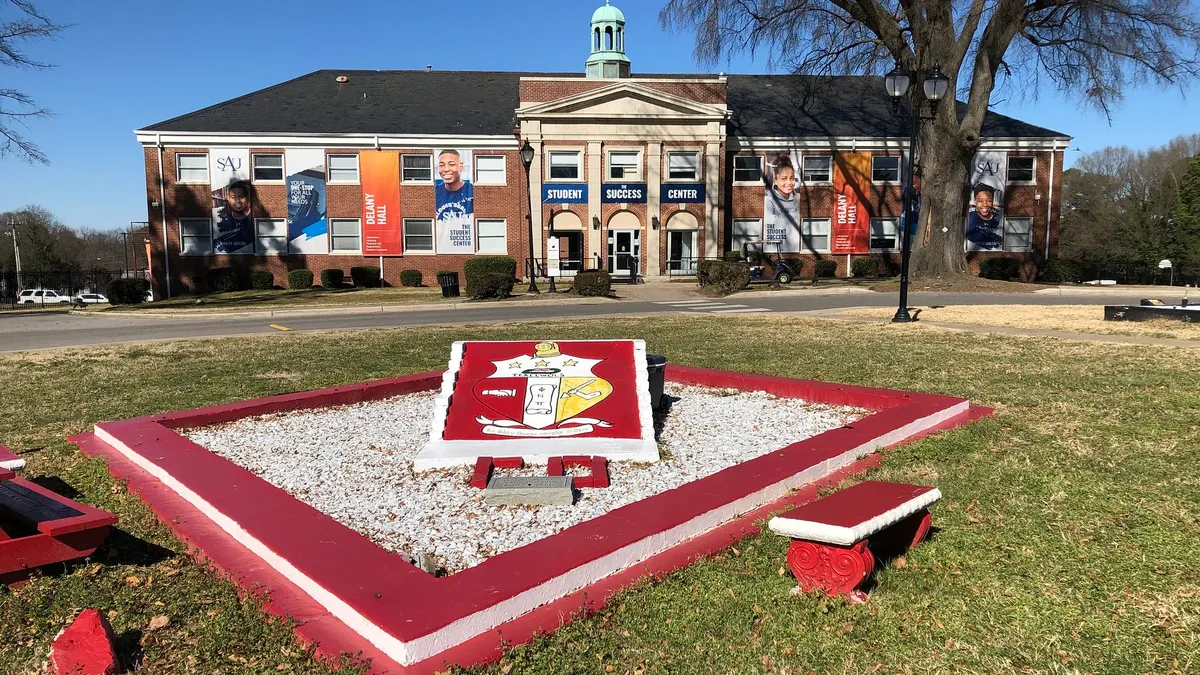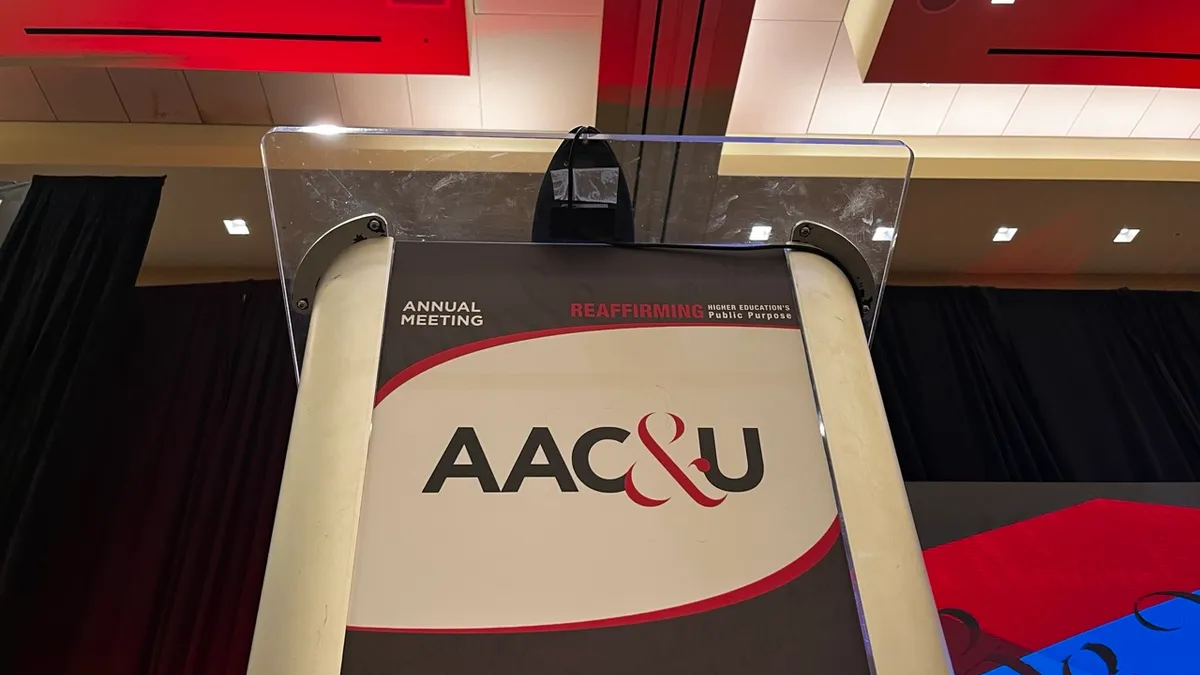When Tania Tetlow started in July at Fordham University, a Jesuit institution in New York City, she became both its first woman president and its first president who is not a priest.
But it wasn't the first time Tetlow has been in that position. She was also the first woman and first lay president in her last job, as president of Loyola University New Orleans, a Jesuit institution with about 4,600 students.
Tetlow stabilized a tumultuous budget situation after she began at Loyola in 2018. Fordham, which has some 17,000 students, isn't facing such financial difficulty, but Tetlow's first months there have brought their own challenges. The university needs to reach a new contract with adjunct faculty, and the union representing them protested at her inauguration in October. Fordham also has a policy mandating COVID-19 vaccines, including boosters, that's sparked controversy.
Before becoming a president, Tetlow was a top administrator and law professor at Tulane University. She sat down to talk about recent events, her plans at Fordham, and what it's like to lead a religious institution at the current moment.
This interview has been edited for clarity and brevity.
HIGHER ED DIVE: What are your priorities at Fordham?
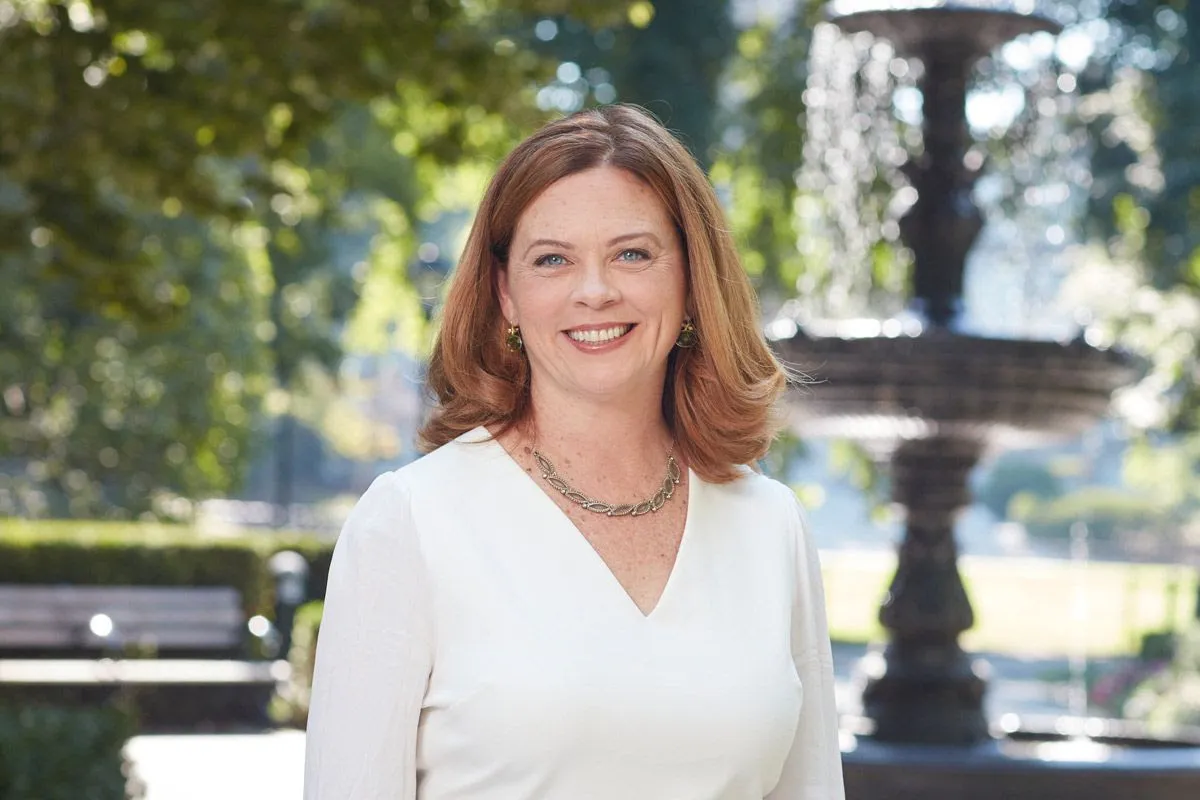
TANIA TETLOW: Long term, I want to aim us in the direction of having as much impact on the world as possible. Students right now crave that from us and deserve it, and I think they can smell the difference between the performative version of virtue-signaling versus meaningful purpose and making a difference in the world.
In the short term, it's wrapping my arms around the budget, figuring out how to be strategic in how we spend money, how to move a big ship a little more quickly.
Fordham's adjunct union protested at your inauguration. What was that experience like?
They were polite about it, handing out leaflets at a distance. I actually didn't see it from the inauguration, so I worried about it more than it was actually an issue.
But it's difficult, because what you want to do is have the kind of ability to communicate where you get to the right answer, where you're not put in a position of having to reward behavior that you find problematic — and not being seen to respond to ultimatums. And so, it's tricky to get the negotiations right, where you don't end up coming to the agreement you would have come to anyway, but in a way that appears like you responded to enormous pressure.
What I'm trying to get across to people who don't know me yet is the way to persuade me is with the quality of the argument, that they're not going to make me afraid. What I respond to is the desire to get these decisions right and finding ways that Fordham can do a better job in a higher ed market for faculty that's become pretty unfair in how it's cleaved apart — and that we don't have a choice but to operate in those markets.
It's an uncertain time for college finances.
We all have the balance of how to respond to a moment of great inflationary pressure on our budgets, inflationary pressure on our people, who are feeling it keenly and would like us to make it up to them in wages — but then keeping costs down for our students.
Are you doing a listening tour in your first year?
There's no choice about the listening tour, the taking in vast amounts of information, making people know that you want to hear them.
My current, immediate priority is to find ways, after years of reactive budget planning in response to COVID, to going back and introducing more strategy in the budget process. Because the budget is the most important expression of our values and our strategy.
You dealt with a difficult budget situation in your last presidency. Layoffs were happening at Loyola right as you started.
Yes, up until a week before.
What did you learn from that experience?
Some of this is looking backwards at Loyola, but it matters how quickly you pull yourself out of denial and how quickly you pull the institution out of denial.
The great advantage I had with Loyola was, they were thoroughly out of denial and they'd made a lot of the painful decisions about the cuts that had to happen, and they did it in a very careful way to avoid impacting students.
Retention went up, not down.
When there are those kinds of constraints, there is the ability to tackle waste in an absolute way. What is harder is at an institution where things are fine and there is enough, but there's never quite enough if you don't spend it strategically, persuade everyone of the need to be frugal without austerity.
Nothing we do isn't important. But if you were starting from scratch every year, you probably wouldn't build quite the budget that you have or the structure that you have.
But Fordham is 180 years old, so in any long-standing institution, which our universities tend to be, they don't move very quickly — for very good reasons. We resist the trends of the day and outside interference. We play the long game, we invest in our people. How to balance those values with strategy is really tough.
How do you approach being a "first" leader — in your case, the first woman and lay president of two different universities?
As a first layperson, it matters enormously to really understand the culture of the religious identity and religious order that you are serving, because it is the subject of great anxiety for people — turning over that symbolic authority.
But it is also, to put it in business terms, the brand and the corporate culture of the place. To be entrusted with that is a very big deal, and for anyone thinking about that role, they really need to study hard and know what they're doing. It is not a small thing for me to replace Jesuits who have a decade of training before they are ordained.
As the first woman or first of anything, it's a surreal experience because I just live within myself and I don't perceive how jarring it is for everyone else. But there is a way you represent visible progress, and I get the loudest applause before I open my mouth, when I am introduced. It is exciting for people.
You did this once and you decided to do it again. Were the firsts a factor you thought about when taking the Fordham job?
I have become entirely dedicated to the project of Jesuit higher education and its almost 500 years of history, so it does feel like an honor and responsibility to do that work of transitioning an institution from visible Jesuit leadership to a layperson — who reminds everyone that it was already true that we will lose this mission if we don't all own it.
It's a big opportunity, and when done right it can make the institution even more focused on mission, because they know we can't outsource it to the few priests at the university. It is something we all have to own.
Your father was a Jesuit who left the priesthood —
To marry. Yes.
I bring that up because you mentioned understanding the culture of the religious order. Does your family background help?
I have unusual training, not of the formal kind, but of training since birth. My mother is also a theologian, so dinnertime conversations revolved around biblical studies.
It's an interesting time for Catholic education because, much like broader society, a struggle is taking place within the church. Fault lines are on display at colleges — Fordham's vaccine mandate has been controversial, for example.
How do you navigate those fault lines?
Part of it is making sure the church and your community understands what we are doing at a university is not preaching to the choir. Quite literally, we are in mission territory. This is where the church engages with broader society.
Our students are religiously diverse. Increasingly secular, as well. What we do when we have broad academic debate is critical to the nature of a university, and Catholic doctrine absolutely endorses that.
From my experience, for the most part the church has very much understood and welcomed that. There are moments of conflict where someone in authority doesn't understand that, but I have found it very important to have those conversations, to have good relationships with the local bishops or cardinals, to warn them if something is coming up, because they will get the blowback with me, and vice-versa.
When you have a situation like the vaccine mandate, how much do you as the president have to wade into the details?
Those decisions were always being made. We've always had vaccine requirements, from meningitis to measles. But no, that is something we all have to be involved in, because it comes down to fundamental balancing of public safety, the health of our community, our ability to function versus not wanting to restrict individual liberty.
So it matters that we own those decisions and explain them well. In this case, to me, the balance has been in making sure that we have an application for exemption process that does honor people's strongly held individual beliefs.
These complex topics often get simplified to a dichotomy.
That's where I feel Catholic institutions have a role. The fundamental core of our doctrine is the belief in a common good and our willingness to make sacrifices for the common good. And that is a fundamental American political belief, too, but it has fallen a little bit by the wayside of late.
In a Catholic institution, where before I spent a career at a secular one, that language of values is far easier for me to access and more available for me to use.



